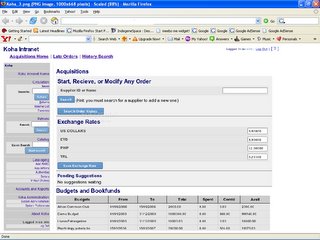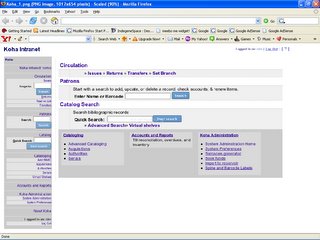My Gateway
University of Washington Libraries
My Gateway debuted in the fall of 1998. Includes remote authentication and access to circulation information services. As of January 1999 about 1500 users had created My Gateway pages.
http://www.lib.washington.edu/resource/help/MyGateway.html
BraryDog
Public Library of Charlotte & Mecklenburg County
"Your Homework Help and Web Companion." Written in ASP, this is a noteworthy example from a public library. Great graphics and appealing promotion as an integrated tool for education. Includes The Brarydog Rap.
http://www.brarydog.net
My Library
California Polytechnic State University Library
This personalized library webpage service is integrated into document delivery and is targeted to graduate students and faculty.
http://www.lib.calpoly.edu/mylib/cgi-bin/index.cgi
My Library
Cornell University Library
Consists of MyLinks, a tool for collecting and organizing resources for private use by a patron, and MyUpdates, a tool to help scholars stay informed of new resources provided by the library. For more information see the April 2000 article in D-Lib Magazine.
http://mylibrary.cornell.edu/
The Portal Formerly Known As MyLibrary@NCState
Hosted at Notre Dame University Libraries
Offers subject specific groupings of content, updates, and remote authentication, extensive descriptions about the architecture, planning, and administration of the system. Includes guest access so you can take it for a test drive. Source code is available for download at http://dewey.library.nd.edu/mylibrary/.
A selected list of libraries employing the NC State code:
MyWelch
Johns Hopkins Welch Medical Library
Written in Cold Fusion. When you register, you select your areas of interest, and then appropriate resources are selected as your defaults (you can modify them later). Includes one click access to other services such as e-mail and borrower information, news feeds, links to online reference, and a personal note pad. Includes guest access. Version 3.0 was released April 2004 with expanded features including a UMLS Concept Search, Tab Interface, Web File Server, and Weather Room.
https://mywelch.welch.jhmi.edu/
Personalized Eccles
University of Utah, Health Sciences Center
Based on the library's homepage design, this is an interesting example of the use of personalization within a specialized library. The source code is available from Wayne Peay.
http://medstat.med.utah.edu/personalize/welcome.html
My Library@UT Southwestern Medical Center Library
University of Texas Southwestern Medical Center
Written with Cold Fusion, users can add choices from different modules including direct links to e-journals. Includes an e-mail alertint feature..
http://www2.utsouthwestern.edu/cfdocs/library/mylibrary/myliblogin.html
my.library
University of Toronto Libraries
Written with Cold Fusion..
http://www.library.utoronto.ca/mylibrary/
MyLibrary
Christchurch College of Education, ChristChurch, New Zealand
Written with PHP..
http://mylibrary.cce.ac.nz/index.php?Action=login
My Library @ CDL
California Digital Library
Written with Cold Fusion..
http://mylibrary.cdlib.org/
myLibrary
Mississippi State University Libraries
Written with ASP. Provides guest access.
http://library.msstate.edu/mylibrary/index.asp
Selected University Portal Projects
My UCLA
University of California Los Angeles
Since its debut in October 1997, over 33,000 different students have successfully created pages for a total of over 1.2 million distinct authenticated sessions. My UCLA includes access to class schedules, campus information and web based email (using student selectable pop/smtp servers) but without a unique library component. Includes a guest page and technical documentation.
http://my.ucla.edu
uPortal
JA-SIG
"uPortal is an open-standard effort using Java, XML, JSP and J2EE. It is a collaborative development project with the effort shared among several of the JA-SIG member institutions. You may download uPortal and use it on your site at no cost. "
http://mis105.mis.udel.edu/ja-sig/uportal/
FOR updation see this link :http://www.library.vcu.edu/mylibrary/cil99.html









